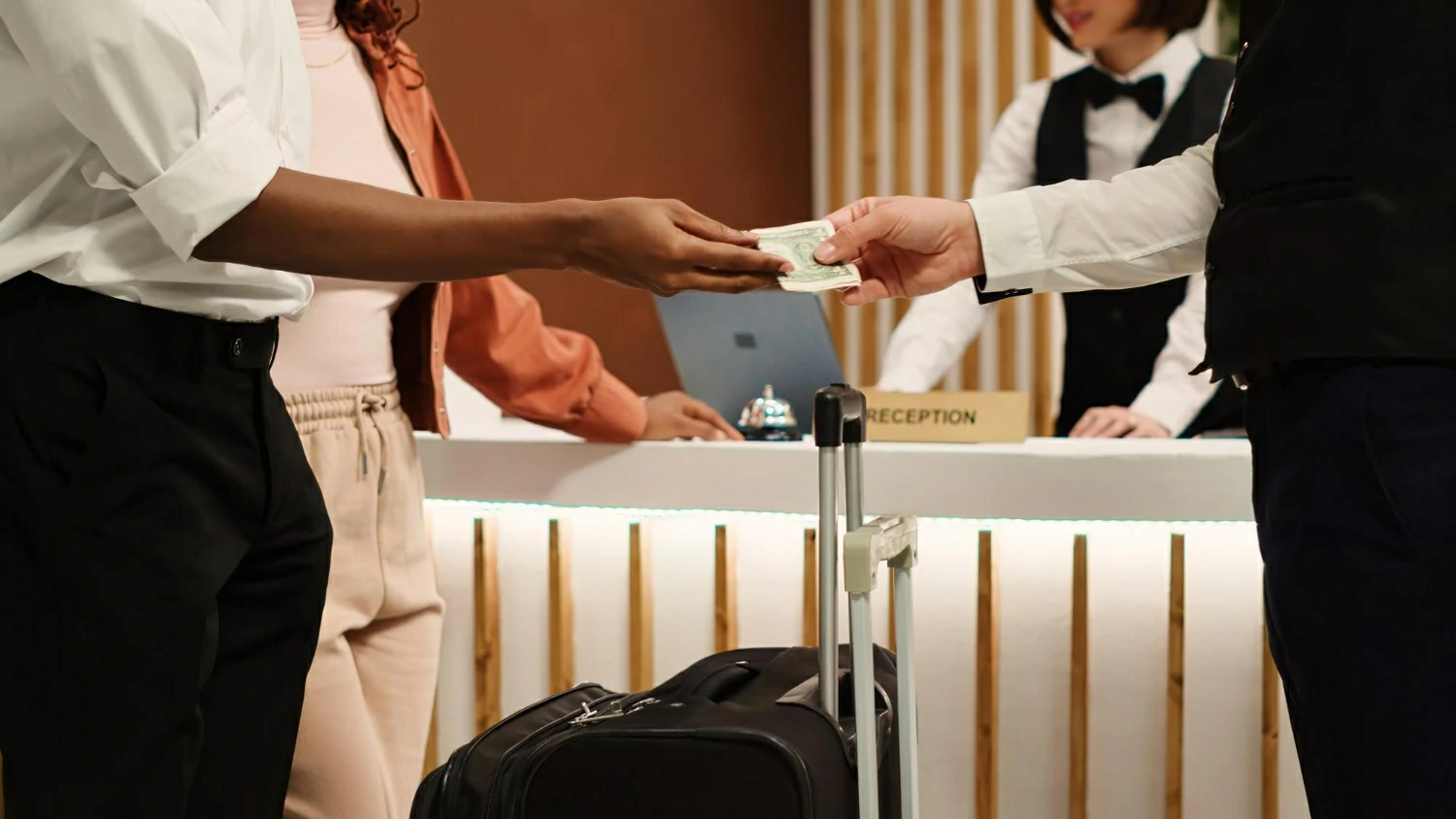Tipping in Italy: When Should You and Shouldn’t You? Answer is – Tipping in Italy is not mandatory, as service charges are usually included in the bill. However, rounding up the bill or leaving a few euros is a common way to show appreciation for good service. This is especially true in touristy areas. In more casual settings like bars or cafes, leaving small change is perfectly acceptable.
Summary
- Tipping is not mandatory but appreciated in Italy.
- Round up the bill or leave a few euros in restaurants.
- Small change is sufficient in cafes and bars.
- Tipping is more common in tourist areas.
- Avoid tipping taxi drivers unless they provide extra service.
- Consider tipping tour guides and hotel staff for exceptional service.
Tipping in Italy

The Culture of Tipping in Italy
Tipping in Italy isn’t as straightforward as in some countries. It’s a land where a gesture like rounding up the bill can speak volumes about your appreciation for service, yet overdoing it might raise eyebrows.
Tipping as a Sign of Appreciation
Unlike the mandatory tipping culture of some countries, tipping in Italy is not a strict requirement. However, it is viewed as a way to express gratitude for good service.
When a waiter goes above and beyond, a small tip is a gesture of recognition, much like saying “grazie” (thank you) with a few extra euros.
The “Coperto” (Cover Charge)
It’s important to be aware that many restaurants in Italy include a “coperto” or cover charge on the bill. This charge typically covers bread, water, and sometimes a small appetizer. It’s not a tip for your server but rather a fee to the establishment.
Regional and Situational Variations
Tipping customs can vary slightly across Italy. In tourist-heavy areas, tipping might be more common, while in smaller towns, it might be less expected.
Similarly, the type of establishment plays a role – leaving a tip at a fine-dining restaurant might be more customary than at a casual cafe.
Cash is King
While credit cards are widely accepted in Italy, when it comes to tipping, cash is usually preferred. This is because it ensures that your tip goes directly to the person who served you.
To navigate the intricacies of tipping in Italy with grace and cultural sensitivity, let’s explore specific scenarios in the following sections, from dining etiquette to tipping taxi drivers and hotel staff.
Luca Local Expert Opinion
“Tipping in Italy is more of a personal choice than a mandatory practice,” says Luca, a seasoned waiter in Rome. “A small gesture of appreciation is always welcome, but remember, it’s the quality of service, not the amount of the tip, that truly matters.”
Tipping in Restaurants

1. When to Tip in Restaurants
In Italian restaurants, tipping is not obligatory, but it’s a common practice to show appreciation for good service. If your waiter or waitress has been attentive, friendly, and efficient, a small tip is a thoughtful gesture.
Additionally, if they’ve provided extra assistance, like recommending a fantastic local wine or accommodating special requests, a slightly larger tip is appropriate.
2. How Much to Tip in Restaurants
There’s no strict rule for tipping in Italian restaurants, but a general guideline is to round up the bill to the nearest €5 or €10.
Alternatively, you can leave a few euros on the table. For example, if your bill comes to €47, you could round it up to €50.
In more upscale establishments, a tip of 5-10% of the total bill is also acceptable. Remember, the amount you tip is ultimately a personal decision based on the level of service you received.
3. Tipping with Credit Cards in Restaurants
While credit cards are widely accepted in Italy, it’s customary to leave cash tips in restaurants.
This is because many establishments pool credit card tips and distribute them among the staff, meaning your individual server might not receive the full amount.
If you do wish to tip with a credit card, inform your server beforehand and clarify that the tip is intended solely for them.
4. Understanding the “Coperto” (Cover Charge)
Many restaurants in Italy include a “coperto,” or cover charge, on the bill. This fee typically ranges from €1 to €3 per person and covers bread, water, and sometimes a small appetizer.
It’s essential to differentiate the “coperto” from a tip. While it contributes to the overall cost of your meal, it’s not a gratuity for your server. You can think of it as a fee for using the restaurant’s facilities and enjoying the ambiance.
Tipping in Cafes and Bars

Tipping in Italian cafes and bars is generally less expected than in restaurants, as these establishments are often more casual and service is typically quicker. However, showing your appreciation with a small gesture is still a common practice.
1. Tipping Etiquette in Cafes
In cafes where you order and pay at the counter, leaving a tip is not necessary.
However, if you’re sitting at a table and a waiter or waitress takes your order and brings your drinks, leaving a small tip is a kind gesture.
You can simply round up the bill to the nearest euro or leave some spare change on the table.
2. Leaving Change in Bars
In Italian bars, leaving a tip is also optional, but a small gesture is appreciated, especially if you’ve ordered multiple drinks or received friendly service.
In this setting, it’s customary to leave loose change on the counter or in a tip jar. A euro or two is usually sufficient, but you can adjust the amount based on the level of service and the number of drinks you’ve ordered.
Giulia a Local’s Opinion
“In cafes and bars, tipping is a way to say thank you for good service,” says Giulia, a barista in Florence. “It’s not expected, but it’s always appreciated, even if it’s just a few coins.”
Tipping Taxi Drivers

Tipping taxi drivers in Italy is not expected or mandatory. In fact, it’s not a common practice among locals. However, there are certain situations where offering a small tip can be a nice gesture of appreciation.
1. When to Tip Taxi Drivers
Exceptional Service: If your taxi driver has gone above and beyond, such as helping with your luggage, offering local recommendations, or navigating a particularly tricky route, a small tip is a great way to say thank you.
Late-Night Rides or Special Occasions: For rides late at night or during special occasions like holidays or festivals, a small tip can be a way to acknowledge the driver’s availability and service.
Rounding Up the Fare: Instead of a specific tip amount, many locals simply round up the fare to the nearest euro. For example, if your fare is €18, you could round it up to €20. This is a subtle and convenient way to show your appreciation.
2. How Much to Tip Taxi Drivers
If you decide to tip, a few euros are usually sufficient. There’s no need to overthink the amount. A simple “thank you” along with the tip is enough to express your gratitude.
Marco a Local’s Opinion
“Tipping taxi drivers is not something we typically do in Italy,” says Marco, a taxi driver in Milan. “But if a passenger wants to show their appreciation, a small tip is always welcome.”
Tipping Tour Guides and Hotel Staff

While not mandatory, tipping tour guides and hotel staff in Italy is a customary way to show your appreciation for their hard work and expertise.
These individuals often go above and beyond to ensure you have a memorable and enjoyable experience, and a tip is a simple way to acknowledge their efforts.
1. Tipping Tour Guides
Tour guides in Italy rely on tips as a significant part of their income. If your guide has provided you with insightful commentary, interesting anecdotes, and helpful recommendations, a tip is certainly warranted.
For group tours, a tip of €5-10 per person is standard. If you’re on a private tour, consider tipping 10% of the tour cost. Always tip in cash at the end of the tour and express your gratitude for their services.
2. Tipping Hotel Staff
Tipping hotel staff in Italy is not as common as in some other countries, but it’s a thoughtful gesture for exceptional service.
- Concierge: If the concierge has gone out of their way to assist you with restaurant reservations, transportation arrangements, or other special requests, a tip of €5-10 is appropriate.
- Bellhop/Porter: For help with your luggage, a tip of €1-2 per bag is customary.
- Housekeeping: Leaving a few euros per day on your pillow or bedside table is a nice way to show your appreciation for the housekeeping staff.
Sofia a Local’s Opinion
“Tipping is a way to show your appreciation for the hard work and dedication of those who help make your stay in Italy enjoyable,” says Sofia, a concierge at a luxury hotel in Venice. “It’s not expected, but it’s always a welcome gesture.”
Tipping in Other Situations

While dining and travel are common areas for tipping, there are other situations where a gratuity might be appropriate in Italy.
1. Hair Salons and Spas
In hair salons and spas, tipping is similar to other countries. If you’re happy with the service you received, a tip of 10-15% of the total bill is customary.
This can be given directly to the stylist, therapist, or aesthetician who provided the service. If you’ve received multiple services from different staff members, it’s appropriate to tip each person individually.
2. Other Service Providers
For other service providers like hairdressers, barbers, or massage therapists working independently, a small tip of a few euros is appropriate. This can be given in cash at the end of the service.
Regional Differences in Tipping
While the general principles of tipping in Italy remain consistent, there are some regional variations to be aware of.
1. Tipping in Tourist Areas
In popular tourist destinations like Rome, Venice, and Florence, tipping may be more common and even expected by some service providers.
This is partly due to the influence of international visitors who are accustomed to tipping.
However, it’s always a good idea to observe the locals and follow their lead. If you’re unsure, err on the side of generosity and offer a small tip for good service.
2. Tipping in Smaller Towns
In smaller towns and villages, tipping may be less prevalent and even considered unnecessary by some locals.
However, a small gratuity is still appreciated as a sign of goodwill and appreciation for good service.
It’s a good idea to observe the local customs and tip accordingly. If you’re unsure, ask a local for guidance or simply follow your instincts and tip when you feel it’s warranted.
Conclusion
As we’ve explored, tipping in Italy is not mandatory but a thoughtful gesture to show appreciation for good service. By understanding the nuances of tipping etiquette in different situations and regions, you can navigate this aspect of Italian culture with confidence and ensure a positive experience for both you and the service providers.
Key Takeaways for Tipping in Italy:
- Restaurants: Round up the bill or leave a few euros.
- Cafes and Bars: Leave small change or round up.
- Taxis: Not expected, but a small tip for exceptional service is appreciated.
- Tour Guides: Tip €5-10 per person for group tours, 10% for private tours.
- Hotel Staff: Tip €5-10 for concierge, €1-2 per bag for bellhops, a few euros per day for housekeeping.
- Other Services: Tip 10-15% for hair salons and spas, a few euros for other service providers.
- Regional Differences: Be aware of variations in tipping customs between tourist areas and smaller towns.
FAQs
Is tipping mandatory in Italy?
No, tipping is not mandatory in Italy. However, it’s a common way to show appreciation for good service.
Do I need to tip if a service charge is included?
If a service charge is included in your bill, you don’t need to tip additionally, unless you’d like to reward a specific employee for exceptional service.
What’s the best way to tip in Italy?
The best way to tip in Italy is with cash. This ensures that your tip goes directly to the person who provided the service.
How much should I tip for specific services?
The amount you tip depends on the type of service and the level of satisfaction. Refer to the guidelines provided in this article for specific recommendations.







